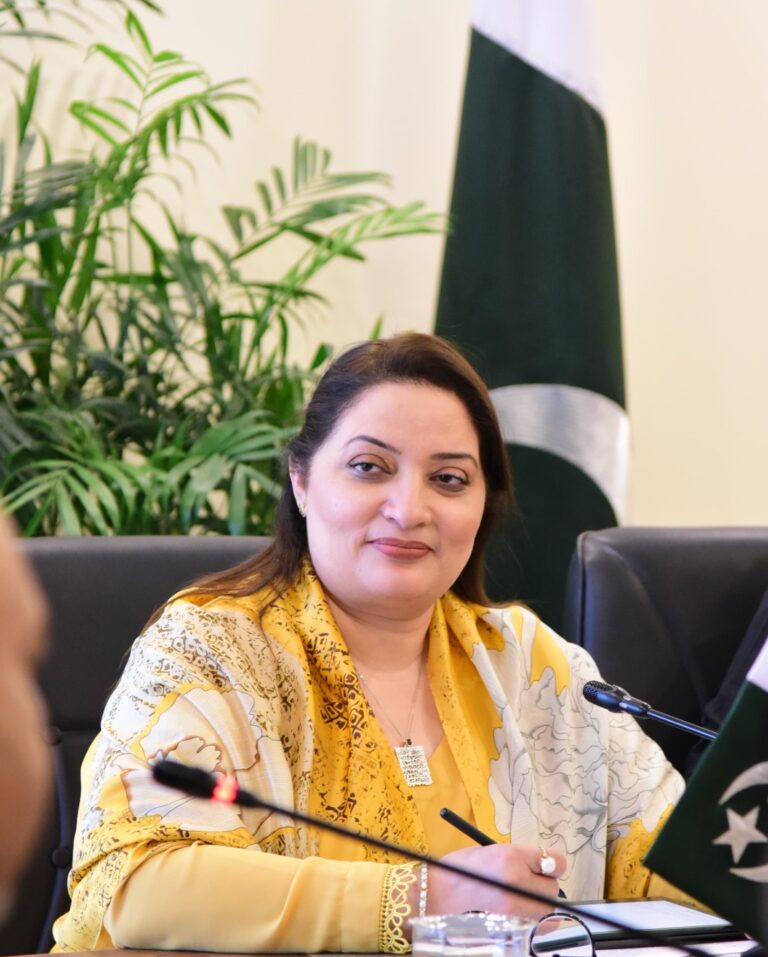Islamabad, Oct 27: Romina Khurshid Advocates for Regional Climate Action Data Bank to Support Evidence-Based Climate Response. In a recent high-level meeting with representatives of the V20 member nations, Prime Minister’s Coordinator on Climate Change Romina Khurshid Alam reaffirmed Pakistan’s commitment to strengthen regional cooperation among the Vulnerable Twenty (V20) Group, which represents 70 nations from the most climate-vulnerable regions. She also promised her full support for the establishment of the V20 Climate Action Data Bank.
The PM’s climate aide said in a news release released here on Sunday that “establishing the proposed data bank would be indeed a groundbreaking initiative to consolidate data on climate risks, economic losses, and financial resilience-building needs of the V20 group member countries.”
She expressed her nation’s readiness to take the lead in organizing the other nations in the V20 group to establish the vital data bank. Romina Khurshid Alam added that by offering the vital evidence-based data required for well-informed decision-making and resource mobilization from available climate regional and international funding channels for the result-oriented climate actions through adaptation and mitigation efforts, this centralized platform would seek to enable V20 countries to effectively deal with the negative effects of climate change.
A group of finance ministers from nations that are most vulnerable to the effects of climate change is known as the Vulnerable Twenty (V20) Group. The V20 was founded in Lima, Peru, in October 2015 with the goal of encouraging more funding for low-emission development and climate resilience.
The V20, which has 70 member nations from Africa, Asia, the Caribbean, Latin America, and the Pacific as of October 2024, represents more than 1.7 billion people and contributes only 5% of the world’s heat-trapping carbon emissions.
According to the PM’s climate aide, the V20 nations, which have a combined population of over 1.7 billion, are currently disproportionately impacted by climate change. Sea level rise, harsh weather, and increasing environmental deterioration are problems that many of these countries face, endangering their economy, vital infrastructure, populations, and means of subsistence.
The new data bank is unavoidable to improve access to trustworthy data to fortify climate resilience measures and leverage international finance, she emphasized, given the increased climate vulnerability of the V20 countries.
The PM’s climate aide Romina Khurshid Alam emphasized that the proposed V20 Data Bank would be a significant step forward in our joint efforts to protect our economies, vital infrastructure, and vulnerable communities from the devastating effects of climate change. “We can make sure that every dollar is well spent and every action is informed by the best available evidence by centralizing data and making it widely accessible for decision-makers, policymakers, and planners,” she said.
She added that although climate finance must move more quickly and precisely, this vital data bank would also help remove obstacles and speed up the flow of money from different regional and global funding sources, like the Loss and Damage Fund, Adaptation Fund, and Green Climate Fund, to the areas that need it most.
“The proposed V20 data bank would also be instrumental to enhance regional cooperation by facilitating the sharing of critical climate-related data and resources aimed at improving understanding of vulnerabilities and risks,” the PM’s climate aide said, emphasizing the significance of the data bank of the world’s most climate-vulnerable countries, including Pakistan, Bangladesh, Nepal, Bhutan, Sri Lanka, Mangolia, Cambodia, Kyrgyzstan, and the Philippines.
She also emphasized how V20 member nations should better coordinate their responses to climate concerns, foster creative financing structures, and conduct collaborative risk assessments by pooling data.
The PM’s climate aide stated, “The V20 countries can also strengthen collective resilience efforts with this new and crucial collaborative approach, ensuring that countries can better prepare for and respond to climate impacts, ultimately fostering sustainable development across the region.”
She emphasized how improving risk management, prompt, well-informed decision-making, and increasing regional cooperation can all aid in luring investment and producing financial gains.
According to Romina Khurshid Alam, having access to thorough climate data could also help governments negotiate better terms for debt-for-nature swaps, debt relief, or restructuring with international financing organizations like the World Bank, Asian Development Bank, and International Monetary Fund. This would relieve fiscal pressures and allow governments to direct resources toward development and resilience projects rather than debt servicing.
